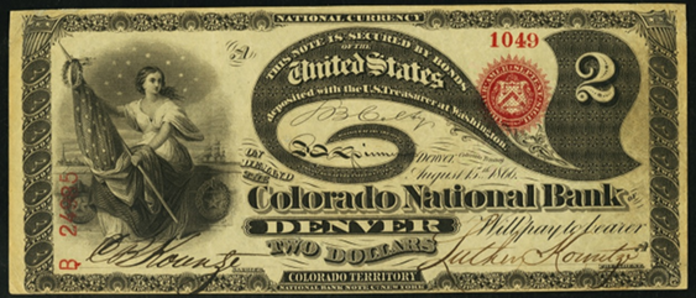Two Dollar Notes › Nationals › 1863 Two Dollar Original Series National Bank Notes › Rhode Island Charters › 1863 $2 Providence Rhode Island Fourth National Bank
Get Value Now
| Item | Info |
|---|---|
| Series | 1863 |
| Charter | #772 Fourth National Bank of Providence, Rhode Island |
| Year Chartered | 1865, 944 Banks Chartered |
| City Info | Providence is the capital of and most populous city in the U.S. state of Rhode Island, founded in 1636 and one of the oldest cities in the United States. It was founded by Roger Williams, a religious exile from the Massachusetts Bay Colony. He named the area in honor of "God's merciful Providence", which he believed was responsible for revealing such a haven for him and his followers to settle. The city is situated at the mouth of the Providence River at the head of Narragansett Bay. Source: Wikipedia |
| Similar Cities | 25 banks with similar city. First 12 below: 1. Providence, Rhode Island - First National Bank 2. Providence, Pennsylvania - First National Bank 3. Providence, Rhode Island - Second National Bank 4. Providence, Rhode Island - Third National Bank 5. Providence, Rhode Island - Phenix National Bank 6. Providence, Rhode Island - Rhode Island National Bank 7. Providence, Rhode Island - Fifth National Bank 8. Providence, Rhode Island - Mechanics National Bank 9. Providence, Rhode Island - National Eagle Bank 10. Providence, Rhode Island - National Bank of North America 11. Providence, Rhode Island - Globe National Bank 12. Providence, Rhode Island - Merchants National Bank |
| Seal Varieties | Red with rays |
| See Also | If your note doesn't match try: 1. 1862 $2 Legal Tender 2. 1869 $2 Legal Tender |
| Other Info | 1. Value depends on notes known for charter, condition and market demand. |
| Neat Fact | Full and partial sheets of National Bank Notes are known to exists. Families of bank officials, particularly those who signed the notes, kept them as keepsakes. Some sheets are extremely valuable. Others are more common. |
No Obligations Offers and Appraisals
Please submit a good photo or scan. It will be identified and evaluated. Understand there may be subtle differences between the image you see above and your note. Signatures, design, markings and note condition will determine the offer price. Notes in Uncirculated or better condition receive the best offers.
Appraisals can be estimated for wholesale and retail prices. Wholesale is what dealers typically pay. Retail is what a collector might pay. Retail is slightly higher in most cases.
Please visit this page for USA Paper Money Reference. Do not treat this page as a reference guide, it is for appraisal and acquisition purposes only.
